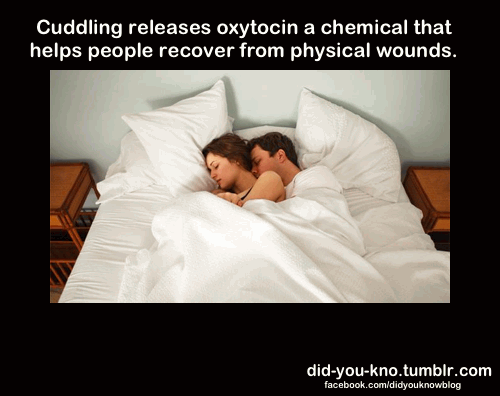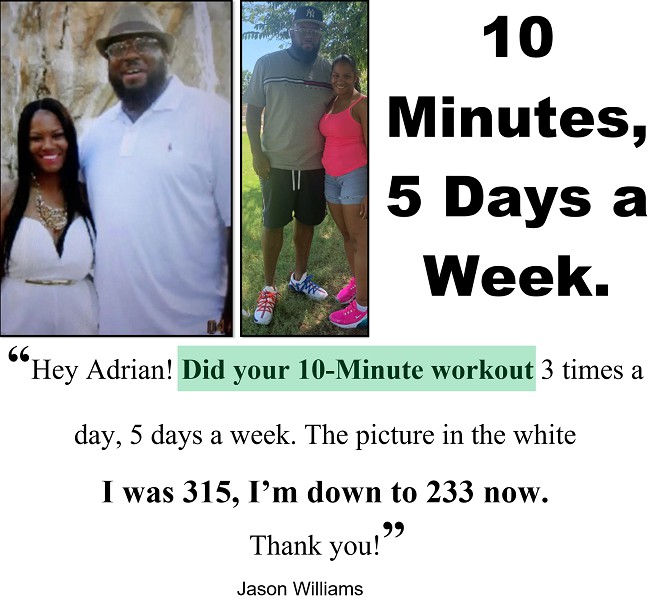13 Ways to Get Rid of Muscle Soreness After a Workout
1. Cuddle

2. Protein
Your sore muscles need protein to repair itself so,
You also need to drink at least a liter of water a day because dehydration makes your muscle soreness and muscle cramps worse.
3. Ice
Ice reduces the inflammation in your sore muscles.
- Use ice the first 2 days after a tough workout where you think you may end up having a significant amount of muscle soreness to minimize muscle soreness.
- After the first 2 days of icing your sore muscles for 15-to-30 minutes at a time… Include many of the other 12 ways to help reduce muscle soreness.
4. Active Recovery
In active recovery you stay active doing an activity a LOT LESS Intense than the activity which caused your muscle soreness so for example,
- If your muscles are sore after running, you'd actively recover your sore muscles with a light walk
- If you did a chest workout with heavy weights, you'd actively recover with lighter weights or push-ups
Usually,
- Light walking or normal daily activities for less than 30 minutes helps reduce lower body soreness.
- Bodyweight exercises like push-ups, bodyweight rows or yoga helps reduce upper body soreness.
Active recovery gets rid of muscle soreness & stiffness by stimulating blood flow to the muscles without overexerting your already sore muscles.
5. Rest
Common sense should already tell you to rest or not do the same tough workout too often until your sore muscles have fully recovered → 16 Ways to Sleep Better Every Night
- If you're trying to lose weight, do only 2-to-4 high intensity interval workouts a week.
- If you're trying to build muscle, you only need to workout the same muscle once every 72 hours for results → see why
6. Massage
Massage the muscle for up to 20 minutes to help reduce soreness after a tough workout.
- ART (Active Release Technique) massage therapy quickly reduces muscle soreness.
- Having a friend or your spouse massage your sore muscles → How to Give Your Partner the Hottest Massage Ever
- Using an electric handheld massager, a Massage Stick, Massage Chair or Foam Roller will also work.
7. Heat
Heat will get rid of muscle soreness by bringing more blood to the sore area helping speed up recovery and heat gets rid of stiffness while relaxing your muscles.
You can easily apply heat to your sore muscles for about 10 minutes by taking a hot bath or shower, using a heating pad or sauna.
8. Alternate Ice & Heat Treatments
Switch back-and-forth applying ice & heat to get the best of both worlds. Reduce inflammation with ice and then increase blood flow to your sore muscles with heat to speed up recovery.
- Contrast showers where you alternate between 30-to-60 seconds of cold water followed by 1-to-2 minutes of hot/warm water 3-to-4 times.
- Ice packs for 10 minutes followed by heat packs on your sore muscles for 20 minutes.
When alternating Ice & Heat, always start with ice followed by heat and make the heat treatment last twice as long as the ice treatment → 7 Health Benefits of Cold Showers
9. Epsom Salt Baths
Bathing in a warm bath for 10-to-20 minutes with 200-to-400 grams of Epsom salt relaxes sore muscles and decreases inflammation by increasing the blood flow to your muscles.
Placing a warm rag soaked in warm water with Epsom salt added over sore muscles also works.
Quick Tip → How to get a flatter stomach with Epsom salt
10. Turmeric
- Turmeric applied directly to sore muscles did a better job at reducing soreness than ice did in this study
- This study found Turmeric supplements also works for soreness.
- The Journal of Pain Research says Turmeric is better than 500 mg of acetaminophen at fighting pain.
11. Ginger
Ginger helped reduce muscle soreness by 25% according to a study where people took ginger 8 days before a tough workout.
12. Take Arnica Pills
When 82 marathon runners took 5 Arnica Pills twice a day on the day before, the day of, and 3 days after their marathon race… They had less soreness than the marathon runners who didn't take arnica pills during this study
13. Black Cherry Juice
Scientist believe that the flavonoids & anthocyanins in Black Cherry Juice is what helps prevents muscle soreness. At least 2 British studies have shown that cherry juice speeds up recovery from intense exercising.
5 Facts About Preventing Muscle Soreness
1. You really can't avoid muscle soreness
More than likely you will always have some degree of muscle soreness after a tough workout like HIIT or muscle building workouts but the degree of your muscle soreness will vary depending on your fitness level.
2. Muscle soreness comes after new workouts
Even if you're already in good shape, you'll more than likely always get sore after trying a new workout or exercise your muscles are not used to.
3. Muscle soreness comes after long layoffs
If you haven't worked out in a long time then expect to be sore after your first tough workout.
The only way to prevent or minimize soreness after a long layoff is to gradually work your way back up to the level of intensity you were at before you took a long layoff.
4. Don't take anti-inflammatory meds
Anti-inflammatory medications like Motrin, Ibuprofen, Aleve and Advil may help relieve some of the discomfort of muscle soreness but studies show that anti-inflammatory medications can delay recovery.
5. There is no evidence that stretching is good for muscle soreness
Stretching may be good for preventing injuries before workouts but studies show that stretching does not make a difference in preventing or reducing muscle soreness.
More Ways to Reduce Muscle Soreness
- the 7 Best Natural Muscle Relaxers
- 8 Ways to Instantly Get Rid of Cramps
- 16 Ways to Sleep Better Every Night
- 18 Ways To Relieve Back Pain
